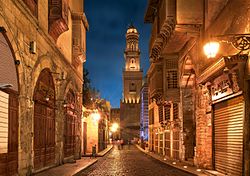Cairo
Cairo (Arabic: القاهرة, usually transliterated as Al-Qāhirah) is the capital and largest city in Egypt. The city name can be translated as the one who won. Cairo is sometimes called "Mother of the World" (Um al Dunya).[4]
|
القاهرة | |
|---|---|
|
| |
| Coordinates: 30°2′40″N 31°14′9″E / 30.04444°N 31.23583°ECoordinates: 30°2′40″N 31°14′9″E / 30.04444°N 31.23583°E | |
| Country | |
| Governorate | Cairo |
| Founded | 969 CE |
| Founded by | Fatimid dynasty |
| Government | |
| • Governor | Atef Abd El Hamid[1] |
| Area | |
| • Metropolis | 214 km2 (83 sq mi) |
| • Metro | 17,267.6 km2 (6,667.1 sq mi) |
| Elevation | 23 m (75 ft) |
| Population (2017) | |
| • Metropolis | 19,500,000 |
| • Density | 19,376/km2 (50,180/sq mi) |
| • Urban | 18,290,000 |
| • Metro | 20,439,541 |
| • Demonym | Cairene |
| Time zone | UTC+2 (EET) |
| Website | www.cairo.gov.eg |
| Official name | Historic Cairo |
| Type | Cultural |
| Criteria | i, iii, vi |
| Designated | 1979 |
| Reference no. | [3] |
| State Party | Egypt |
| Region | Arab States |
Cairo has 7,947,121 people. About 17,290,000 people live in its urban area. This makes it the biggest city of the Arab World.[5] It also is the city with the biggest urban area in Africa
Geography
Climate
The city of Cairo has a hot desert climate (BWh), meaning it has a hot, sunny and dry climate a year long. The city, however, has more humidity than other cities with the hot desert climate (BWh).
| Climate data for Cairo | |||||||||||||
|---|---|---|---|---|---|---|---|---|---|---|---|---|---|
| Month | Jan | Feb | Mar | Apr | May | Jun | Jul | Aug | Sep | Oct | Nov | Dec | Year |
| Record high °F (°C) | 88.0 (31.11) |
93.6 (34.22) |
100.2 (37.89) |
109.8 (43.22) |
118.0 (47.78) |
115.5 (46.39) |
108.7 (42.61) |
110.1 (43.39) |
110.7 (43.72) |
106.0 (41.11) |
99.3 (37.39) |
86.4 (30.22) |
118.0 (47.78) |
| Average high °F (°C) | 66.0 (18.89) |
68.7 (20.39) |
74.3 (23.5) |
82.9 (28.28) |
90.0 (32.22) |
93.0 (33.89) |
94.5 (34.72) |
93.6 (34.22) |
90.7 (32.61) |
84.6 (29.22) |
76.6 (24.78) |
68.5 (20.28) |
81.95 (27.75) |
| Daily mean °F (°C) | 56.5 (13.61) |
58.8 (14.89) |
62.4 (16.89) |
70.2 (21.22) |
76.1 (24.5) |
81.1 (27.28) |
81.7 (27.61) |
81.3 (27.39) |
79.0 (26.11) |
73.9 (23.28) |
66.0 (18.89) |
59.0 (15) |
70.5 (21.389) |
| Average low °F (°C) | 48.0 (8.89) |
49.5 (9.72) |
52.9 (11.61) |
58.3 (14.61) |
63.9 (17.72) |
68.2 (20.11) |
72.0 (22.22) |
71.8 (22.11) |
68.9 (20.5) |
63.3 (17.39) |
57.4 (14.11) |
50.7 (10.39) |
60.41 (15.782) |
| Record low °F (°C) | 34.2 (1.22) |
38.5 (3.61) |
41.0 (5) |
45.7 (7.61) |
54.1 (12.28) |
61.0 (16.11) |
64.8 (18.22) |
66.0 (18.89) |
58.1 (14.5) |
54.1 (12.28) |
41.4 (5.22) |
37.0 (2.78) |
34.2 (1.22) |
| Precipitation inches (mm) | 0.20 (5.1) |
0.15 (3.8) |
0.15 (3.8) |
0.04 (1) |
0.02 (0.5) |
0.00 (0) |
0.00 (0) |
0.00 (0) |
0.00 (0) |
0.03 (0.8) |
0.15 (3.8) |
0.23 (5.8) |
0.97 (24.6) |
| Source: World Meteorological Organization (UN) (1971–2000),[6][7] | |||||||||||||
History
The area around the city was an important focal point of Ancient Egypt.
In 968, the Fatimids entered Egypt and they made Cairo the capital of their caliphate.[8]
The Al Azhar mosque and university was made in 972. This became the world's oldest university. It is the most widely known seminary in the Islamic world.[4]
In 1992, Cairo was devastated by a 5.8 magnitude earthquake that caused 545 deaths, injuring 6,512, and made 50,000 people homeless, the most destructive since 1847.
Tourism
The great pyramids of Giza and the step pyramid of Sakkara are just outside of the city.[4]
The Egyptian Museum holds the world’s largest collection of antiquities from the time of the ancient Pharaohs. Many treasures from the tomb of King Tutankhamun are in this museum.[4]
Famous Cairenes
People from Cairo are called 'Cairenes'.
- Abu Sa'id al-Afif - Fifteenth Century Samaritian
- Boutros Boutros-Ghali, former Secretary-General of the United Nations
- Naguib Mahfouz, novelist, Nobel Prize in Literature in 1988.
- Mido, Professional soccer player with Middlesbrough F.C
- Mohamed ElBaradei, Director General of the International Atomic Energy Agency 2005 Nobel Peace Prize laureate
- Naguib Sawiris, 62nd richest person on earth in a 2007 list of billionaires, reaching US$10.0 billion with his company Orascom Telecom Holding
- Farouk El Baz, a great contributor to NASA
- Sir Magdi Yacoub, leading cardiologist, knight
- Constantin Xenakis (1931) Greek artist
- Voula Zouboulaki (1931) Greek actress
Notes
- ↑ "محافظ القاهرة يرفض تطوير المستثمرين الحدائق.. ويؤكد: "هيسحلوا الغلابة"". Retrieved 14 September 2016.
- ↑ "Cairo | national capital, Egypt". Encyclopedia Britannica. Retrieved 2020-07-21.
- ↑ UNESCO World Heritage Centre. "Historic Cairo – UNESCO World Heritage Centre". Whc.unesco.org. Retrieved 2017-09-20.
- ↑ 4.0 4.1 4.2 4.3 Hedges, Chris. "What's Doing in Cairo," New York Times. January 8, 1995.
- ↑ Demographia World Urban Areas & Population Projections (PDF), Demographia, April 2009, retrieved 9 July 2009
- ↑ "Weather Information for Cairo". World Meteorological Organization. Retrieved April 14, 2014.
- ↑ "Cairo (A) Climate Normals 1961–1990". National Oceanic and Atmospheric Administration. Retrieved April 14, 2014.
- ↑ Beeson, Irene. "Cairo, a Millennial," Saudi Aramco World. September/October 1969, pp. 24, 26-30.
References
- Hedges, Chris. "What's Doing in Cairo," New York Times. January 8, 1995.
Other websites
 Media related to Cairo at Wikimedia Commons
Media related to Cairo at Wikimedia Commons Geographic data related to Cairo at OpenStreetMap
Geographic data related to Cairo at OpenStreetMap- Cairo information Archived 2007-02-21 at the Wayback Machine at yatb.info
- Blog about Cairo
- Places in Cairo









